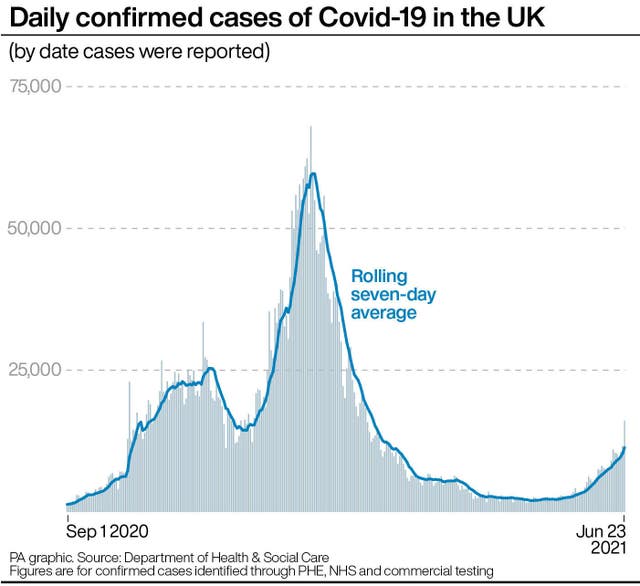Longest ever Covid case as man tests positive for 305 days
Dave Smith said he celebrated the news he was Covid negative with a bottle of champagne.

A 72-year-old man has described how he became what is thought to be the world’s longest ever Covid patient after testing positive for the virus for 305 days.
Dave Smith, from Bristol, a retired driving instructor, said he was ready to die and give up on life.
He had Covid-19 for more than 10 months in what experts have said is the longest-ever recorded persistent infection with the virus.
He told the BBC how he coughed for “five hours straight, non-stop… if you can imagine the drain that puts on your body, the energy”.
He added: “I was ready to give up, I said to Lyn my wife ‘let me go, I’ve been hanging on, it’s so bad now, I’m just jelly’. If I go in the night, don’t be surprised.”
His wife Lynda said there were “a lot of times we didn’t think he was going to pull through.”
Mr Smith said he celebrated the news he was Covid negative with a bottle of champagne.
Mr Smith had conditions which led to him having a compromised immune system, putting him more at risk from Covid-19.
He told The Guardian: “Whenever I went bad, I went really bad – down to death’s door. My wife started to arrange a funeral five times.”
He added jokingly: “I called all the family in to make my peace with them. I wish I’d kept my mouth shut now.”
He said his weight fell from 18.5 stone to 10 stone (117kg to 64kg) while ill due to a lack of appetite, adding: “At one point, I was bedridden for two or three months. My wife had to wash and shave me in bed because I just couldn’t stand up.
“Sometimes I thought: I wish they’d take me in the middle of the night, because I just can’t go on anymore. You get to the point where you are more afraid of living than you are of dying.”
His case is to be presented to the European Congress of Clinical Microbiology & Infectious Diseases (ECCMID) in July.
An abstract, which is to be presented to the conference, describes how Mr Smith’s infection is thought to be the “longest infection recorded in the literature”.
Academics from the University of Bristol, North Bristol NHS Trust and Public Health England, said Mr Smith was admitted to hospital in May 2020 with a cough and fever.
A PCR test confirmed he had Covid-19.
He was discharged after eight days but he had “significant breathlessness and went on to have interspersed acute deteriorations associated with fever” which required further hospital admission in August, September, October and December.
The experts noted that in December 2020 a trial of daily remdesivir therapy was discontinued after 17 days as it had no effect.
He later received treatment with monoclonal antibodies casirivimab and imdevimab.
Mr Smith was successfully treated with the laboratory engineered antibodies, the University of Bristol said.
It added that his health improved dramatically, and the virus was not detected in PCR tests 45 days after the combined treatment.
The combination of antibodies, by pharmaceutical firm Regeneron, have since been shown to save the lives of some of the sickest Covid-19 patients in a clinical trial, but the treatment regime is yet to be approved for use in the UK.
Mr Smith no longer tests positive some 305 days after first infection, academics have told conference officials.

They said he reported symptoms for six weeks before his first test so they suspect infection was actually longer – meaning that he could have continuously tested positive for the virus for almost a year.
Mr Smith had a history of a condition called hypersensitivity pneumonitis, which meant he had lung disease causing inflammation of the lung tissue and chronic lymphocytic leukaemia – a type of cancer that affects the white blood cells and tends to progress slowly over many years.
Dr Ed Moran, consultant in infectious diseases at North Bristol NHS Trust and co-author on the paper, added: “It is wonderful that we were able to help this individual.
“Whilst such cases are rare there will be a number of people across the country in similar situations.
“The small numbers make it difficult to perform trials of experimental therapies. However, it is important that we find a way to access and develop treatment regimens for these individuals both for the wellbeing of the individual and to protect public health.”
Academics are conducting further research into “persistently infected immunocompromised individuals”.
Other researchers have previously detailed a case which lasted for 85 days.
A number of people have spent long periods of time in hospital after being admitted with Covid-19. But this does not necessarily mean that they will test positive for the whole length of their stay.
Kate Garraway’s husband Derek Draper, a 53-year-old former political adviser, was in hospital for a year after being admitted with coronavirus symptoms and placed in a coma.
And Jason Kelk died on Friday following his decision to withdraw his treatment after more than 14 months in intensive care.
Sky News reported that Mr Kelk, 49, had spent more than a year in intensive care at St James’ Hospital in Leeds after contracting coronavirus in March 2020.





